There are two stories I like to tell about Rob Ford.
The first is the anecdote of the gentleman I met at a Rob Ford barbeque, at the height of the crack scandal. The “Ford Fests,” outsized festivals the mayor and his city councillor brother threw in their own honour, had become a seasonal rite in Toronto, with hundreds of cars snarling traffic for blocks around.
Reporters said they’d seen a tape of Mayor Ford smoking crack; Ford denied everything and called the media “pathological liars.” Ford’s supporters — and there were many thousands at this event alone, waiting in lineups to get free hamburgers and shake the man’s hand — felt that he was the honest one.
I asked the supporter, a small business owner from Scarborough, if his perception of Ford would change if the video turned out to be real. He didn’t pause. “No!” he said. Why? Because, the man explained, if he’d been caught out smoking crack, he’d have lied about it too.
That was Rob Ford: the honest liar. He lied a lot, but boy, you really got where he was coming from. You can trust this guy to be straight with his lies.
I think about that conversation all the time, to this day, as I try to make sense of Rob Ford the man, Rob Ford the phenomenon, and Rob Ford, the collective trauma that gripped the city where I lived in those years, writing about his mayoralty. It was a raw, visceral, emotive time, and it lasted four years. Underneath the coverage, the speculation, the infinite conversations over infinite bar tables and dinner tables, was the question: Who is Rob Ford? Is this an act? Is he cynical or genuine? Who’s pulling the strings here?
From the outside of Toronto looking in, Ford was a curiosity: How could a bunch of Canadians elect a fellow like this? From the inside out, however, there was so much more to it: suburban crusader, folk hero, addict, demagogue, underdog, bigot, and, in ways people might not want to admit, the reinventor of his city.
He came from the middle of Etobicoke, a wildly diverse part of Toronto, far from downtown, where well-to-do neighborhoods like his family’s meet with towering developments, home to booming communities of newcomers. Drugs were always a presence, including in the house where he grew up: His older brothers were reported to have been involved in the drug trade. Over a decade as a city councillor, he pursued a narrow, simple vision of his job, returning every call, tooling around in a beat-up minivan, talking to homeowners and apartment dwellers about their neighborhood concerns. His chief concern was not spending taxpayer money (especially not on things such as bike lanes, AIDS research, and watering plants at city hall that should probably be plastic, though exceptions could be made for things like police helicopters). His legislative record was obstruction and outbursts, but that suited people fine. Shy and awkward in person, he was comfortable on the phone and became a fixture on AM radio. The legend of Rob Ford, champion of the little guy — and, as some have argued, it really was a legend — grew.
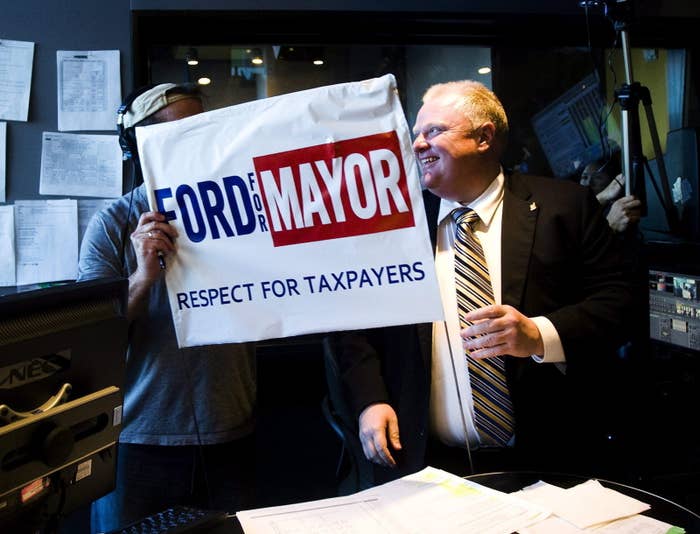
He had mentioned ambitions of being mayor since he’d arrived at city hall. His moment came in 2010. The incumbent mayor, cerebral and progressive, had decided not to run again, and a slate of none-too-compelling political types lined up to replace him. The public mood was not in their favour. Toronto was growing and changing. Only a decade and change earlier, Toronto had been created from six (yes, those 6ix) former municipalities, and the five of them that didn’t used to be called “Toronto” were feeling dispossessed. Wealth was flooding the downtown core, while the inner suburbs, home to an incredible array of immigrants from around the world, struggled out of sight and out of mind.
So when Rob Ford emerged as a champion of everything and everybody who wasn’t fancy, he found a willing audience in the margins. But it wasn’t just economic outsiders whom he appealed to: Well-to-do homeowners felt left out by years of talk about bikes and not cars, about recycling and not garbage pickup. (A lingering, putrid summertime strike by garbage workers had put the city in a union-busting mood.) Conservatives felt frozen out in a liberal city. Economy, society, geography, ideology: There are many ways to feel alienated, and Rob Ford catered to all of them.
The man (and it always seems to be a man) who runs as the champion of the outsider gains a peculiar advantage: He gets to fail upwards. If you run as the enemy of the distrusted institutions of democracy — of the government, of the media — then the more you can do to confound their mores, to annoy their functionaries, to say the unsayable, the more that supporters who feel oppressed and ignored by these institutions will love you. Ford’s specialty for years had been outbursts, but every time newspapers incredulously compiled sidebars of his most bigoted statements, his support only grew.
And so it was that in the middle of his election campaign, Rob Ford was confronted about an old DUI in Florida; he denied it. It was only when a reporter produced undeniable proof that he admitted to it. His opponents watched with glee: Surely, this will shame him into quitting! They weren’t paying attention. A whip-smart campaign team taught Ford to contain his volatility, captured his straightforward views, and packaged them in two snappy slogans (“RESPECT FOR TAXPAYERS” always in caps, and “Stop the gravy train!” always punctuated). He rolled to a landslide victory. In the end, nothing ever shamed Rob Ford into quitting.
So began the mayoralty of Rob Ford. It was a disaster.
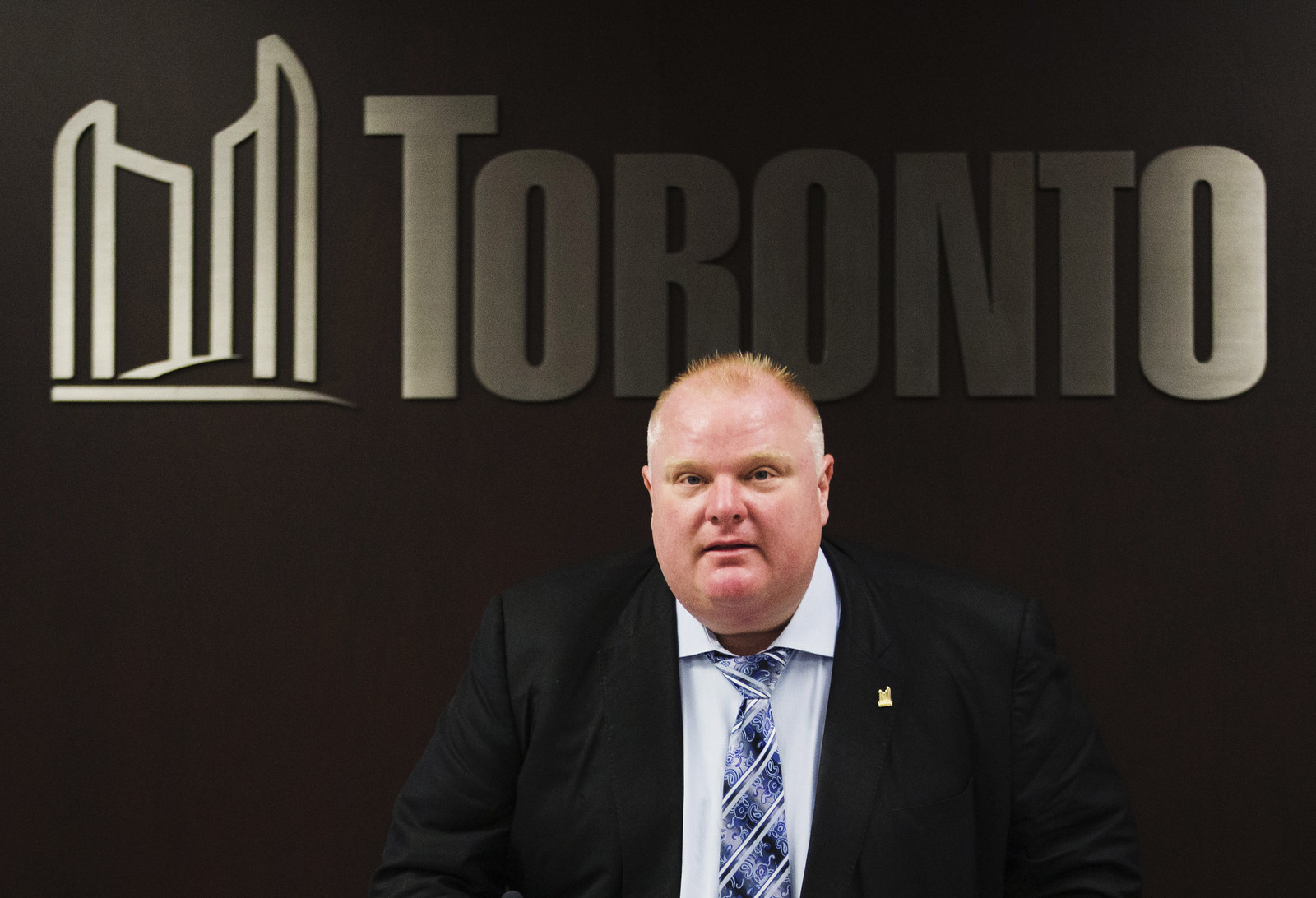
Here are some things that happened, in no particular order: Mayor Rob Ford removed a hated tax on cars; gave the finger to a mother and daughter at a traffic stop (they’d scolded him for talking on the phone while driving); chased a reporter around a park behind his home in a fit of rage and later may have cracked into his abandoned BlackBerry; instituted semi-privatized garbage collection; was pictured hanging out with gang-affiliated men, one of whom was fatally shot shortly thereafter; hired as his personal driver a drug-dealing friend who was convicted of threatening to kill a woman, and who carried around a vial of bedbugs as a threat to his enemies; went to trial and got ordered out of office for conflict of interest by one judge, and then un-removed by another; accidentally banned plastic shopping bags from Toronto when a council vote went sideways; had a busload of transit riders turned out in a rainstorm when he demanded that a city bus be used to transport the high school football team he coached; made a point of boycotting LGBT events; endured a libel suit against him; was escorted out of a city gala for erratic behaviour; repeatedly drove drunk; physically assaulted his staff during an after-hours bender in his office; and had multiple 911 calls made to his house to deal with domestic disturbances.
Long before the wider world noticed, long before there was even an hint of a drug scandal on the radar, Rob Ford eruptions were the drumbeat of daily life in Toronto. His erratic behavior had cost him the political support to make any real decisions once his honeymoon months were over. He was forever accompanied by his older brother, Doug, thuggish and charmless, a red-meat conservative who picked fights wherever he went. The drumbeat became a white noise, a clattering pile of incidents and accidents.
So when, on a warm evening in May 2013, smartphones across Toronto lit up with the news that reporters from two outlets claimed to have seen a video of the mayor smoking crack, everything changed — but not by much. It was a new phase of an old story. The city, having gone through the looking glass, found a new looking glass inside it and went through that one too, until it found another. It was looking-glass Inception.
The city police launched their own intensive investigation. The mayor was trailed around by a bunch of cops in a Cessna. A successful crowdfunding campaign ("Crackstarter") led by Gawker raised $200,000 to buy the crack tape from the extortionists, which indicates a certain desperation on the part of the electorate. He was discovered to have frequented a crack house, where the tape was made, and whose owners were severely beaten by a pipe-wielding assailant who, for some reason, had come looking for the video.
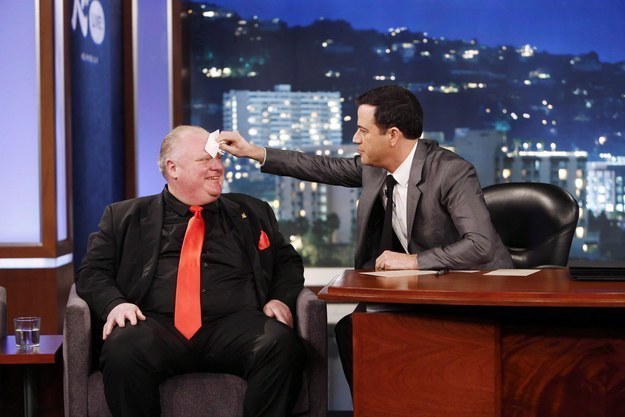
For a year, the city was stuck in an epistemological twilight zone, in which the very nature of truth started doing a rack focus zoom in and out on the mayor. Ford denied smoking crack, then admitted having smoked crack but denied the tape, then was forced to acknowledge the tape, then admitted a relapse but denied an addiction until even more tapes forced him to admit an addiction and enter rehab. He refused to resign, and there was no legal mechanism to remove him. He had his powers stripped by his appalled colleagues, had his beloved high school football team taken away from him, and went to Hollywood and did Jimmy Kimmel Live!, sweating and stammering. He ran for re-election. He might have won had the cancer not intervened.
Even though the press was vindicated in its original reporting of the crack video, Ford still compulsively denied anything that public evidence did not compel him to admit. Journalists, in response, became obsessed with the idea that there was some combination of questions that could be asked that would finally pin the mayor down and extract an accounting of his actions that somehow meshed with reality. But there wasn’t. The Fords were, as it has been observed, bullshit artists who deal less in empirical truths and more in emotional realities.
All the same, the truth about Rob Ford slowly unravelled — first in police reports that laid out, in terrible detail, the contents of interviews with Ford’s inner circle, and then in covert recordings that laid bare the mayor’s behavior under the influence. The picture they painted was of a baby brother from a deeply troubled family, who had the charm and the desire to help individuals that his older, more disciplined brother lacked. His family seemed eager to deny his addiction at every turn. (“He had a couple of pops, big deal,” said Doug, after his brother was filmed visibly intoxicated at a street festival in 2013. Four months earlier, Doug had told a newspaper that he had “never seen Rob drink at any event, ever.”)
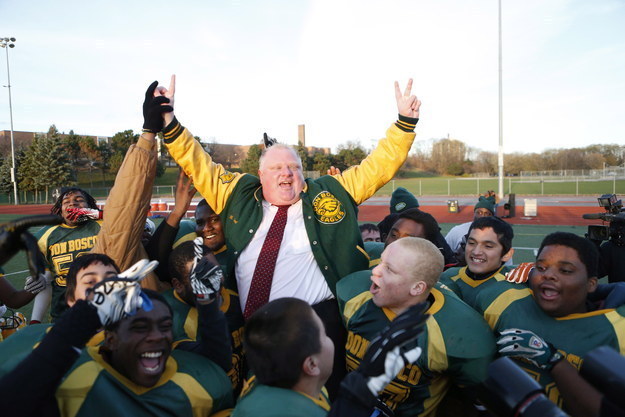
The private life that emerged from recordings and reports was full of an almost puerile racism and misogyny. He seemed to have enjoyed listing off racial epithets to his friends. In public, he had a penchant for backhanded racism, the kind that sounds like a compliment but in practice was corrosively condescending. He poured his time (and some of the city’s, too) into coaching students from a high school football team, many of whom were black. He persisted in describing them as fatherless kids who would have fallen into drugs and gangs were it not for him. He seemed, above all else, childlike, a teenager from the early ’80s transported into the mayoralty as if by body-swap. His friends were petty criminals. His home was a place of verbal and emotional abuse, at a minimum. He called his aides in the middle of the night, crying, from his father’s grave.
The indescribable sadness of Rob Ford was a fact of life for everybody who lived there. The mayor of Toronto was an addict, and because his addiction had become a defining part of Toronto’s public life, we were all living with an addict. It was exhausting and exasperating and infuriating and often darkly comic, and Torontonians spent a lot of time acting like it was all somehow normal. They adapted, because the situation wasn’t going away and they couldn’t change it, and because life has to go on somehow. The man was unhappy and suffering, yet the instinct for compassion had to fight with the constant offence he gave to the people he refused to stop representing, and his staunch unwillingness to help himself, except in the ways he knew how.
Rob Ford’s supporters stuck with him to the end. The lines at the Ford Fests never went away. This was his real legacy. For all the bluster, he did not make any substantial change to the way money was spent at city hall; things tick on as they always have. Otherwise, canny bureaucrats and conscientious peers on council kept him from doing too much damage as a legislator.
What he did do was turn the city inside out and force its cognoscenti to really and truly recognize the people they had been overlooking.
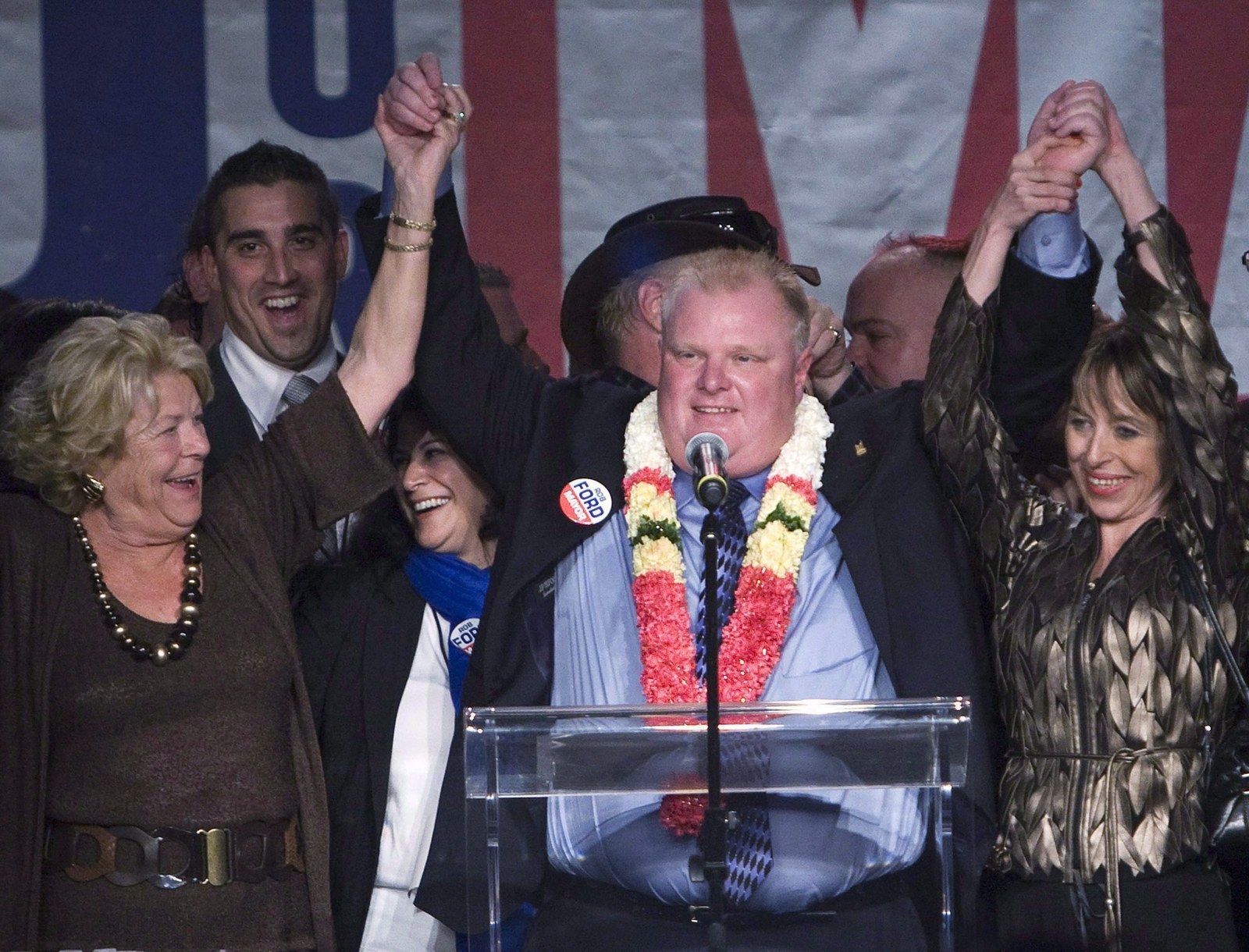
Obituary boilerplate notwithstanding, he did not seem to love Toronto as a whole, and definitely not the downtown parts. He practiced the politics of division with vigour. But he loved the place that he was from, and he represented it — and places like it — fiercely. If you wrote off Rob Ford for his simplicity, or his intuitive logic, or his endless untruths, or any of his other host of shortcomings, you had to account for the hundreds of thousands of people at the city’s edges who felt so strongly about him. Rob Ford dared us to call them dupes. They were not dupes.
This is what I believe about Rob Ford: He believed in public service. He only knew how to do it one way: returning calls, knocking on doors, haranguing low-level bureaucrats for quick fixes. He was never cut out to be a mayor. It is not enough to simply make some of your constituents feel better. He did not actually ameliorate these lives with the power a mayor has. But the impulse to do well by the little guy is genuinely what drove him, and was one of the things that put purpose into a terribly difficult life.
This is worth considering, in a season where Rob Ford is being widely compared to Donald Trump. For all the similarities between the movements both men inspired, Trump’s presidential campaign is driven by a deep cynicism and a willingness to strategically deploy hatred in any way that will benefit him, without bounds of shame or conscience. That was not Rob Ford. If Rob Ford had no shame, then he would not have lied. He was shameless about his lies, but his lies sprang from shame. It is hard to look in the mirror and say I don’t understand that.
So this is the second story I like to tell: I only spoke with Rob Ford once. Like so many others, I spent years in a room with him, watching him in council, listening to him on the radio, standing in scrums. But before he was mayor, he would return your call, because that’s what Rob Ford did.
It was 2009 and Rob Ford’s predecessor as mayor had taken up a new social media platform, and was using it to poke fun of Rob Ford, because that’s what one did at city hall in those days. I called Ford to ask about it.
“What did you call it, Twitter?” said Ford. “News to me! Never heard of it.”
Ford told me he wasn’t bothered by the image on social media. But before the call ended, a thought occurred to him: “Who’s paying for it?”
I assured him that the taxpayers were not on the hook for this.
“Somebody must be paying for this,” said Rob Ford, in a moment of being completely himself, which was most moments, and completely and totally correct, which was slightly less of them. “I mean, how can it be free? Nothing’s free in this world.”
Nothing is. Rob Ford said thanks for the heads-up, hung up the phone, and was gone.
